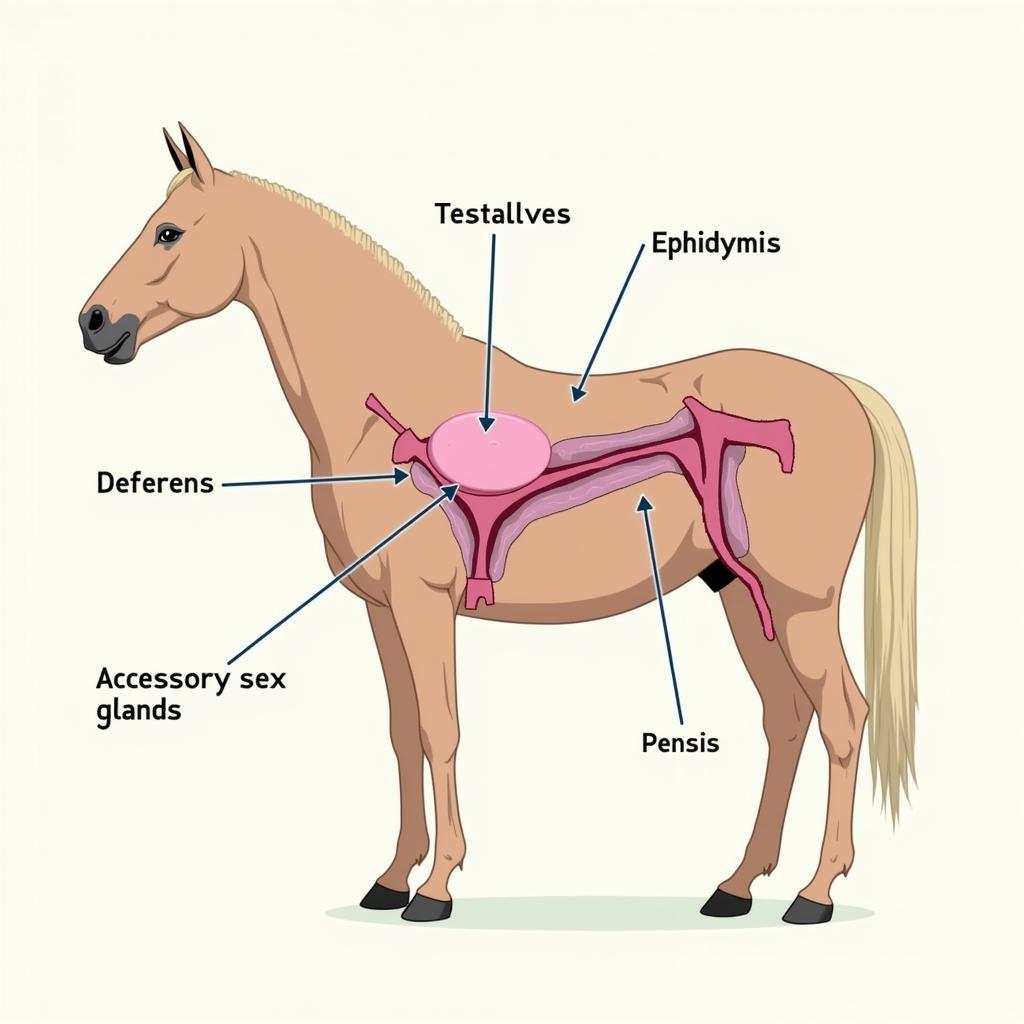The term “Real Horse Cumming” often leads to searches for explicit content. However, for responsible horse owners and enthusiasts, understanding the natural reproductive process in horses is crucial for breeding management and overall equine health. This article aims to provide valuable insights into the physiological aspects of horse ejaculation, dispelling myths and focusing on responsible horse ownership.
The Biology of Horse Ejaculation
Horse ejaculation, like in other mammals, is a complex physiological process. It’s essential to approach this topic with scientific accuracy and avoid sensationalizing it. Understanding the biological mechanisms involved helps breeders make informed decisions and ensure the well-being of their animals.
 Equine Reproductive System Diagram
Equine Reproductive System Diagram
Horses typically reach sexual maturity between 1 and 2 years of age. The stallion’s reproductive system includes the testicles, which produce sperm, and the accessory sex glands, which contribute to the seminal fluid. During ejaculation, the sperm travels through the vas deferens and mixes with the seminal fluid to form semen.
Hormonal Influence on Ejaculation
Hormones play a significant role in regulating the stallion’s reproductive cycle. Testosterone, the primary male sex hormone, influences libido and sperm production. Understanding these hormonal influences is crucial for managing breeding programs and addressing potential reproductive issues.
Responsible Breeding Practices
Responsible horse breeding involves careful planning and consideration of various factors. It’s not just about producing offspring but also about ensuring the health and welfare of the mare and stallion.
- Genetic health testing: Screening for hereditary diseases helps prevent passing on undesirable traits.
- Selecting compatible pairs: Matching mares and stallions based on temperament and conformation improves the chances of producing healthy and well-balanced offspring.
- Proper mare and stallion management: Providing optimal nutrition, exercise, and veterinary care ensures the animals are in prime breeding condition.
Ethical Considerations in Horse Breeding
Ethical breeding practices prioritize the well-being of the animals. Overbreeding and irresponsible breeding practices can lead to unwanted horses and contribute to equine welfare issues. It’s crucial for breeders to be mindful of their responsibilities and contribute to a sustainable equine population.
Dispelling Myths and Misconceptions
The topic of “real horse cumming” is often surrounded by misinformation and sensationalized portrayals. It’s important to rely on scientific facts and avoid perpetuating myths. Focusing on the biological and reproductive aspects helps promote a responsible and informed understanding of equine reproduction.
Dr. Amelia Shepherd, a renowned equine reproductive specialist, emphasizes, “Understanding the natural reproductive process in horses is vital for responsible breeding. We must prioritize the health and welfare of these magnificent animals and avoid sensationalizing sensitive topics.” Dr. Shepherd further advises against seeking out explicit content, advocating for a scientific and ethical approach to understanding equine reproduction.
Professor John Miller, an expert in equine physiology, adds, “Responsible horse ownership entails a deep understanding of the animal’s biology and reproductive cycle. This knowledge is crucial for ensuring the well-being of both the mare and the stallion.” His insights highlight the importance of responsible breeding practices and the ethical considerations involved.
Conclusion
Understanding “real horse cumming” from a scientific and responsible perspective is crucial for horse owners and breeders. By focusing on the biological aspects, ethical considerations, and responsible breeding practices, we can ensure the health and welfare of these magnificent animals. This knowledge empowers us to make informed decisions and contribute to a sustainable equine population. Remember, responsible horse ownership goes hand in hand with a commitment to ethical breeding practices and the well-being of our equine companions.
FAQs
No FAQs provided as this topic is sensitive and requires careful handling of information. For specific questions about equine reproduction, consult with a qualified veterinarian.
Interested in learning more about horses? Check out our articles on horses cumming in women and books like slow horses.
For any assistance, please contact us: Phone: 0772127271, Email: [email protected] or visit us at QGM2+WX2, Vị Trung, Vị Thuỷ, Hậu Giang, Việt Nam. Our customer service team is available 24/7.